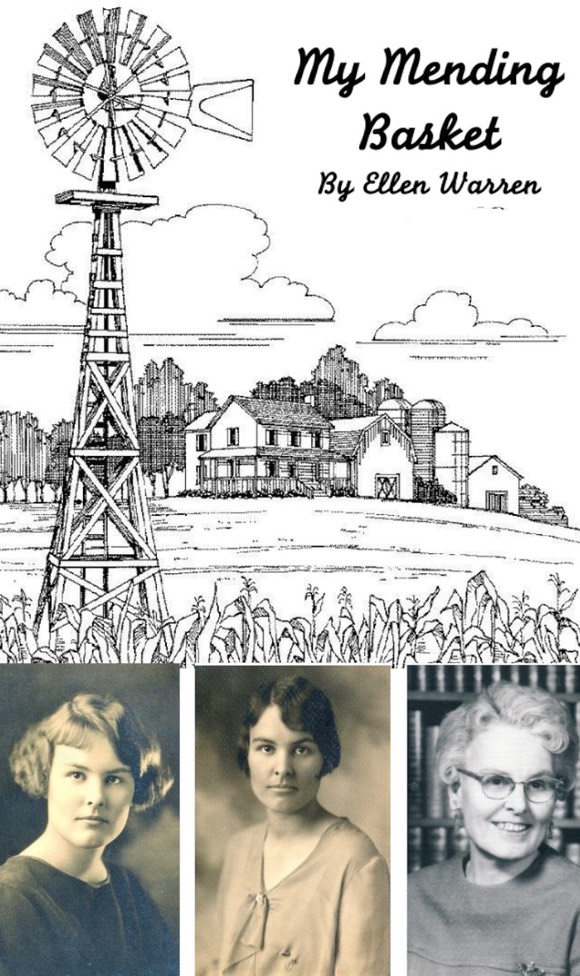
A few weeks ago I learned that several messages directed to this site hadn’t migrated to my personal email account the way they’re supposed to. One of Ellen Morlan Warren’s grandsons, Lee, who lives in Taiwan, had forwarded a couple of pdf’s containing her writings. These included a wonderful collection of columns from the Superior Express which she called My Mending Basket.
A gifted writer who studied journalism at Kansas State University, Ms. Warren produced a polished week-by-week account of farm life in the corn belt during the Great Depression and World War II. I think of it as something like the book we might have gotten out of Emily Dickinson if she had kept a blog. Every time Emma felt too ill or too weary to write another entry, there was that incentive of a crisp dollar bill waiting to be added to the cookie jar. Hers is the sort of memoir most families could only dream of having, if they gave the matter any thought.
Besides leaving behind a collection of weekly musings jotted down during historically troubled times, in the 1970’s the daughter of White Rock merchant Fred Morlan and former schoolteacher Myrtle Angle also compiled a 5o-page overview of the Morlan and Angle families for her children and grandchildren.
Separated though we are by the long, lovely years, by mountains and fertile valleys, with you in your cities and we in our snug house in Doniphan County, we all have a common heritage, and I want you to know some of the generations that have preceded us, You are still a part of them.
Another electronic note, one which I had read before but was happy to revisit, was from Scott Pierce, a resident of my wife’s old hometown in Virginia. Scott, who sent me the article last year about a Revolutionary War plot involving Col. Nehemiah Lovewell, had complimentary things to say about the website. Besides noting my persistence he commended the overall tenor of the site for tending to run “against long, nearly unconsciously held assumptions,” presenting a view of the Old West that is “less like Little House on the Prairie than Buster Scruggs.”
The Ballad of Buster Scruggs, for those who haven’t seen it, is an anthology film from the Coen brothers, who gave us Fargo and No Country For Old Men. In other words, it’s quirky and astringent.
I have to admit to holding some of those same cherished assumptions once, even wishing I could hold on to them longer. When I first saw the 1895 Kansas census for the village of Lovewell, I pored over those handwritten entries as if I had been granted glimpses of a frontier Eden.
The roster of familiar names reminded me that this was the safe harbor Thomas Lovewell created for old friends and neighbors from White Rock, that historic settlement doomed to extinction for lack of a railroad. I quickly spotted the children from his long-lost daughter Julany, a flock which Thomas had shepherded from a dismal St. Louis slum to a cozy new cottage situated between rolling green hills and a shimmering stream.
The pages fairly glowed with the golden warmth of a neighborly, tight-knit community. Initially I saw the census as an artifact that might have been left by pious townsfolk like the ones we used to spy bustling along the streets of Dodge every week at the start of an episode of Gunsmoke (just before troublesome drovers rode into town), or the stalwart, hardworking homesteaders of Little House, taming a new land.
This was a few years before I began digging deeper into newspaper archives, where I would discover a trove of lawsuits and foreclosures, rumors of scandalous behavior by the town’s doctor, evidence of the brazen machinations of greedy bankers and attorneys, shocking cases of burglary, rustling and embezzlement involving local youths, even assault and attempted murder on a busy public street in front of the railroad depot.
Lovewell may not have been Sodom on the Plains, but it was certainly no Eden, either.
One more bit of email I hadn’t seen before was from one of my recent sources, Larry Obermesik, who deciphered and edited the Lost Gold Rush Journals of Daniel Jenks. Mr. Obermesik had just dropped a polite note to let me know that he had seen the page I posted about his book last August and enjoyed reading it.
Finding his note happened to coincide with the arrival of the trailer for Kevin Costner’s ambitious multi-part cinematic epic Horizon, or as I tend to call it, Widescreen. The series may turn out to be a carefully crafted masterpiece that redefines America’s westward expansion for modern audiences, or it may be an extended version of How the West Was Won, intended for IMAX theaters. We’ll see.
Reading the journal entries of Daniel Jenks had made me take one more close look at that “Pikes Peak or Bust” photo I’ve examined so many times before, finally leading me to realize that it’s not a record of recent arrivals, but of imminent departures.
However well-scrubbed and neatly dressed the wayfaring pioneers were when they set out, it was a wild band of filthy, ragged, hairy, hungry, and bedraggled wretches who wearily arrived at their destination, in desperate need of a bath and vowing to think twice before trying anything like that again.